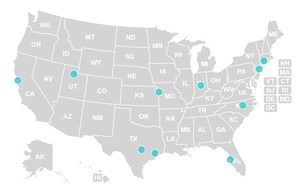BEAD Program's $42 Billion Pledge: Balancing Broadband Access Against Geographic and Economic Challenges
SOUTH JORDAN, Utah, April 30, 2024 /PRNewswire/ -- The Broadband Equity, Access, and Development (BEAD) Program, established under the Infrastructure Investment and Jobs Act allocated a $42.45 billion federal investment in internet infrastructure and accessibility. An analysis by ISP Reports reveals a complex landscape of funding that suggests allocations are based on a mix of geographic challenges and infrastructural needs rather than existing connectivity quality or political affiliations.
The program aims to ensure that all Americans have affordable high-speed internet access, a cornerstone of President Biden's "Investing in America" initiative. While it initially provides a baseline of funding to each state, additional funds are determined by the number of unserved locations and the projected costs of servicing high-cost unserved areas. These areas are typically defined by factors such as remoteness, population density, and topographical difficulties.
Fund Allocation Disparities
In a notable pattern, rural states such as Alaska, Montana, and West Virginia have been allocated significantly higher funding per resident. Alaska stands out with an allocation of $1,377.01 per resident to address its connectivity challenges, illustrating the program's focus on regions where broadband infrastructure development is most expensive and logistically demanding.
Conversely, states like California, which boasts a relatively developed infrastructure, receive lower per-resident funding, reflecting a strategic approach that weighs current infrastructure against the potential cost of development projects. For example, despite its large population and significant economic presence, California's allocation is a modest $46.45 per resident.
The disparity in funding allocation highlights the BEAD Program's broader strategy. The plan does not solely prioritize current internet connectivity quality, as states with varying report card grades, from C to A-, receive funding tailored to the scale and cost of infrastructure development required.
Analysis Indicates Fund Allocation Based on Need and Local Challenges
States in the Northeast, traditionally known for denser populations and better existing infrastructure, see a lower average cost per resident compared to the South, indicating a tailored approach to regional needs. Texas, with its vast geography and mix of urban and rural areas, has been allocated $3.3 billion, signaling a substantial need for broadband expansion despite the state's existing B-grade infrastructure.
The BEAD Program's allocations are a testament to the current administration's commitment to tackling the digital divide by addressing the infrastructural disparities across the nation. Through these targeted investments, the program aims to ensure that every American, regardless of their state's size or existing connectivity, can access the benefits of the digital economy.
The allocation approach underscores the federal government's recognition of the varied challenges states face in providing universal broadband access, reaffirming the commitment to equitable internet service provision as a vital tool for education, healthcare, and economic growth.
About ISP Reports
ISP Reports is a leading platform dedicated to providing comprehensive and updated data on internet service providers in the U.S. Launched to address the need for transparent and current ISP information, ISP Reports draws on the latest FCC data release to offer an extensive database of more than 2,800 ISPs.
Focused on data accuracy and user-centric information, the platform empowers consumers with an advanced address search tool, delivering individualized details for precise and informed decision-making. This granular level of data ensures users can confidently choose the ISP services that best fit their specific needs. ISP Reports commits to offering an in-depth view of the ISP landscape, supporting consumers as federal initiatives work to expand high-speed internet across the nation.
Media Contact:
Edwin Ivanauskas
801-984-8100
376860@email4pr.com
SOURCE ISP Reports







Share this article